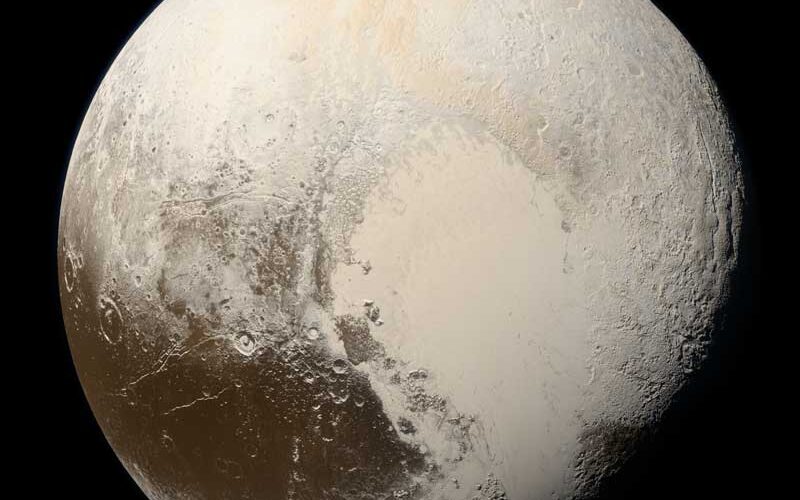What is Pluto?
There are planets orbiting the sun as well as the Earth in the solar system. Neptune is the planet orbiting the sun at its farthest distance. However, the title of the planet farthest from the sun did not belong to Neptune. It was Pluto.
Percival Lowell, an American astronomer, discovered that Uranus’ orbit was unstable in the early 1900s. He thought that the gravitational effects of Neptune as well as those of other planets were affecting the orbit of Uranus. He claimed that there would be an undiscovered planet behind Neptune. He died without proving his claim, but in 1930, astronomer Clyde W. Tombaugh discovered Pluto near the location predicted by Lowell (Science Reference Section, Library of Congress, 2019).
However, many astronomers became skeptical about the claim that Pluto’s gravity affected the orbit of Uranus because Pluto’s mass is very small. Pluto is smaller than Earth’s moon. Then why is Neptune now the farthest planet from the sun, even though Pluto was designated as a planet in 1930?
What are the standards of a planet?
Although there seems to be no major difficulty in defining a planet, it is unlikely that many people know the standards exactly. The International Astronomical Union has suggested that three criteria must be met to be defined as a planet in 2006 (NASA, 2019):
- A celestial body must orbit the Sun to be defined as a planet. The planets’ satellites do not meet the planet’s standards because they revolve around planets, not the Sun.
- The celestial body must have enough mass to have sufficient gravity to maintain a spherical shape.
- The celestial body must have enough gravity to dominate the orbit around the Sun. Only a celestial body that clears other objects in its orbit can get the title of a planet.
Some people think that in order to be defined as a planet, it must have a satellite that orbits it, but this is not included in the criteria for defining a planet.
The reasons Pluto is no longer considered a planet
In 2006, the International Astronomical Union officially set standards for defining planets. As a result, Pluto, formerly considered a planet, was demoted from a ‘planet’ to a ‘dwarf planet’. Then, for what reason was Pluto classified as a dwarf planet? It does not meet one of the three planetary requirements described above. Eight planets, from Mercury to Neptune, meet all requirements, but Pluto does not. Pluto orbits the Sun and maintains a spherical shape, but does not have enough gravity to clear other objects in its orbit. In other words, other planets absorbed or removed the celestial bodies in their orbit by their gravitational force while orbiting the Sun for a long time. However, Pluto, along with numerous other ice objects in the Kuiper Belt, orbits the Sun. Moreover, although other planets have almost perfectly circular orbits, Pluto has an elliptical orbit, and its orbit slope is also much more inclined than other planets’. For these reasons, Pluto was removed from the solar system’s list of planets and was considered a dwarf planet in 2006.
According to the International Astronomical Union, dwarf planets refer to celestial bodies that orbit the sun and have sufficient mass to maintain a round shape but do not have strong gravity to absorb other objects in their orbits. Also, in order to be called a dwarf planet, it must not be a satellite of a planet. In the solar system, there are currently five official dwarf planets: Pluto, Ceres, Eris, Makemake, and Haumea.
Conclusion
Astronomical discoveries are controversial compared to other fields. This is because astronomical objects of observation are less accessible compared to the objects observed for other studies. For example, astronomical discoveries have largely relied on telescope observation from the surface of the Earth. This is improving further with the development of space exploration technology, but new discoveries can continue to change existing theories or assumptions. Pluto’s demotion to a dwarf planet has also caused controversy. Advocates of Pluto, which has been a planet of the solar system for 70 years, also staged protests against it. A new verb was even born, ‘pluto,’ which means to demote or to devalue something. This kind of conflict seems to be an inevitable factor in the development of astronomy. Regardless of these factors, astronomy will continue to develop, and we will have to get used to accepting these changing facts.
References
Kristine De Abreu (2021). Newcomers’ Guide: Why Pluto is No Longer a Planet» Explorersweb. [online] Explorersweb. Available at: https://explorersweb.com/newcomers-guide-why-pluto-is-no-longer-a-planet/ [Accessed 23 August 2022].
NASA (2019). What is a Planet? | Planets. [online] NASA Solar System Exploration. Available at: https://solarsystem.nasa.gov/planets/in-depth/#:~:text=It%20says%20a%20planet%20must [Accessed 21 August 2022].
Remple, A. (2022). Why Is Pluto Not A Planet? [online] WorldAtlas. Available at: https://www.worldatlas.com/space/why-is-pluto-not-a-planet.html [Accessed 23 August 2022].
Science Reference Section, Library of Congress (2019). Why is Pluto no longer a planet? [online] Library of Congress, Washington, D.C. 20540 USA. Available at: https://www.loc.gov/everyday-mysteries/astronomy/item/why-is-pluto-no-longer-a-planet/#:~:text=Answer [Accessed 21 August 2022].
Featured Image (2022). NASA/Johns Hopkins University Applied Physics Laboratory/Southwest Research Institute/Alex Parker [online] Available at: https://solarsystem.nasa.gov/resources/933/true-colors-of-pluto/?category=planets/dwarf-planets_pluto
